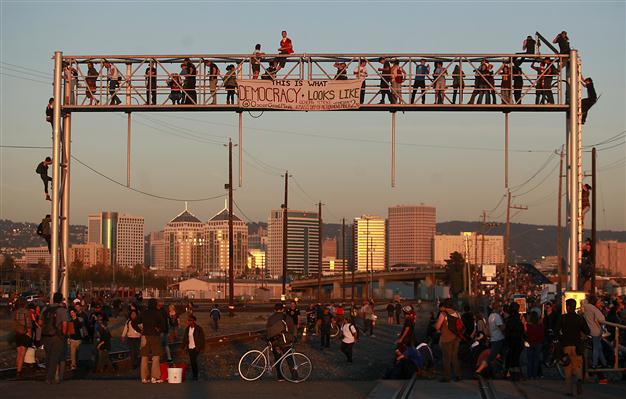Protesters shut Oakland port

The skyline of Oakland flanks Occupy Oakland, Calif., protesters as thousands of people marched to the Port of Oakland, effectively shutting the port down for several hours. AP Photo
Demonstrators on Wednesday shut down operations at the Port of Oakland, one of the largest container ports in the United States, in protests against economic inequality and corporate greed.Thousands of protesters blocked a major Oakland streets in what they called a general strike against economic conditions and police brutality, but fell short of their stated aim of paralyzing the Northern California city.
Business in Oakland appeared to be largely normal, with most stores and businesses remaining open and workers going to their jobs. The Occupy Oakland movement did succeed in shutting down the container port, which handles some $39 billion a year in imports and exports.
"At this time, maritime operations are effectively shut down at the Port of Oakland. Maritime area operations will resume when it is safe and secure to do so," the port said in a written statement to Reuters.
Protesters gathered at the port gates, stood on top of container trucks stranded in the street and climbed scaffolding as a band played Led Zeppelin's song "Whole Lotta Love" amplified by speakers.
Oakland was catapulted to the forefront of the national anti-Wall Street protest movement after a former Marine was badly wounded during a march and rally last week.
The protesters, who complain about a financial system they believe mainly benefits corporations and the wealthy, had aimed to disrupt Oakland commerce on Wednesday, with a special focus on banks and other symbols of corporate America.
"A lot of the small businesses actually have closed," organizer Cat Brooks said of the strike's effectiveness. "A lot of the food places and other things, we appreciate them staying open (to feed protesters)."
Unions not in protest
Local labor leaders, while generally sympathetic to the protesters, said their contracts prohibited them from proclaiming an official strike.
Craig Merrilees, a spokesman for the International Longshore and Warehouse Union, said about 40 out of 325 unionized port workers had stayed off the job.
"There was no call for a strike by the union," he said.
Oakland schools and government offices remained open.
The focal point for the demonstration on Wednesday, which drew an estimated 1,000 people, was the intersection where ex-Marine Scott Olsen suffered a serious head injury last week when marchers clashed with police, an incident that galvanized protesters across the country.
Protest organizers say Olsen, 24, an Iraq veteran who was struck by a tear gas canister fired by police, is in an Oakland hospital in fair condition. Acting Oakland Police Chief Howard Jordan has opened an investigation into the incident but has not said how he believes Olsen was wounded.
"We stand in defense of Scott Olsen and in memory of Oscar Grant," Angela Davis, a radical leader prominent in the 1960s and '70s, said at a rally on Wednesday. Grant was shot dead by a policeman on an Oakland train platform in 2009.
In Los Angeles, several hundred protesters marched through downtown in solidarity with their counterparts in Oakland.
In downtown Seattle, about 300 rain-soaked protesters blocked the street outside the Sheraton hotel where Jamie Dimon, CEO of the biggest U.S. bank, JPMorgan Chase & Co, was to speak.
Earlier in the day, five protesters were arrested for trespassing after chaining themselves to fixtures inside a Chase bank branch, the Seattle Police Department said.
In New York, Mayor Michael Bloomberg told Wall Street protesters he would take action if circumstances warranted, saying the encampments and demonstrations were "really hurting small businesses and families."
More than 800 people have been arrested at anti-Wall Street rallies in New York City since protests began in September. (Additional reporting by Dan Whitcomb, Mary Slosson, Emmett Berg, Matthew Ward and Bill Rigby; Writing by Dan Whitcomb; Editing by Jerry Norton, Cynthia Johnston and Anthony Boadle)
















